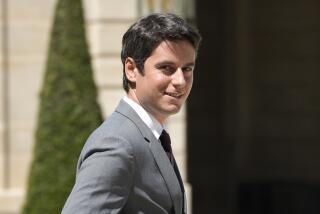Raymond Barre, 83; French prime minister and economist
- Share via
Raymond Barre, a tough-speaking former French prime minister and economist who refused to bow to protesters or political alliances, died Saturday, his family said. He was 83.
Barre died at Val de Grace hospital in Paris, family members said. An exact cause of death was not immediately available, but he was admitted to the hospital April 12 -- his 83rd birthday -- after suffering from heart problems in Monaco, where he was to give a speech on world finance.
Barre was prime minister of France from 1976 to 1981 during a 30-year political career that also included posts as vice president of the European Commission, French economics minister and mayor of Lyon. He made an unsuccessful run for president in 1988.
Barre never joined a political party, though he was linked to the center-right UDF. He used this position to his advantage by playing free agent as a lawmaker in the National Assembly, often voting with the left-wing opposition to the frustration of his conservative allies.
Still, top politicians from France’s governing conservative party expressed their sorrow at Barre’s death.
President Nicolas Sarkozy called Barre a “free and independent spirit” and hailed his “passion for France.”
Prime Minister Francois Fillon said in a statement that Barre’s career “showed that there is no other way than to tell the French people the truth and sometimes to take difficult measures.”
Barre’s longtime rival, former President Jacques Chirac, said in a statement that with Barre’s death, “France has lost a great economist, a politician who was resolutely committed to the modernization of the country.”
Born April 12, 1924, in Saint-Denis on the French island of Reunion in the Indian Ocean, Barre studied at the Reunion Law School before being mobilized into the army in 1944. He was attached to an artillery unit stationed in Madagascar, but the war ended before he could ship out.
He then moved to Paris, where he studied at the Institute of Political Science and received a doctorate in law and economics from the University of Paris in 1950. He began his political career in 1959, working at the Ministry of Industry.
Charles de Gaulle asked Barre to represent France at the European Commission in Brussels in 1972, where he helped form the economic policies of the future European Union.
When he returned to France, Barre replaced Jacques Chirac as prime minister, sparking a rivalry that split the right in France. Barre served as prime minister from 1976 to 1981 under then-President Valery Giscard d’Estaing.
To combat an economic crisis of the late 1970s, Barre imposed strict policies to curb inflation and public spending that resulted in thousands of layoffs. When faced with strong opposition from the unions, Barre dismissed street protesters and told them to get back to work.
In response to these policies, Chirac led a group of defectors to found another right-wing party, the RPR.
In 1988, as both conservative parties ran, Chirac and Barre split the vote, helping Socialist President Francois Mitterrand win reelection. But Chirac was to finally win out as his RPR party grew in strength and he became prime minister a second time, before going on to win the presidency in 1995.
Barre remained in the National Assembly. He was elected mayor of Lyon in 1995, and retired from politics in 2002.
Barre is survived by his wife, Eva, and their two sons, Olivier and Nicolas.
More to Read
Sign up for Essential California
The most important California stories and recommendations in your inbox every morning.
You may occasionally receive promotional content from the Los Angeles Times.













